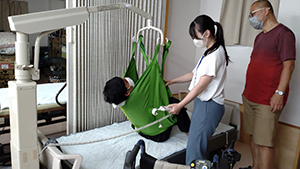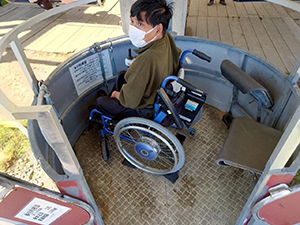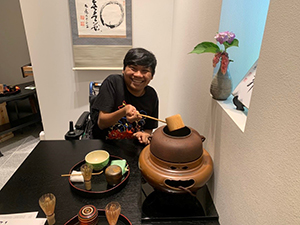- HOME
- Alumni News
- Wen Rouet (participated in the 22nd Program)
- Final Report
Final Report
Wen's Final Report
A Turning Point in My Life
My name is Rouet Wen. I was born and raised in the province of Battambang northwest of Cambodia.
I was accepted as an official trainee of the Duskin Training Leadership Program in Japan. I could hardly verbalize my true feelings at the time. It was more than just contentment.
My training period was scheduled to begin in early September 2020 and end in mid-June of 2021. Just at the same time, the world was struck by the coronavirus pandemic; as a result, I was unable to fly to Japan as planned.
As a result, the first activity of the training was to learn Japanese online in Zoom classes. We were not able to understand the culture, food, and people of Japan through online activities though we were learning the language. This report is a brief account of how my experience in Japan has changed me.
We were a group of five trainees from different countries: Kavinda, Wai, Zo, Jasmin, and me. My training began with a one-month Japanese class. The Japanese class led me onto a journey not just about a new culture, but also about new communication methods.
We also had many group training sessions on Japanese social service systems for people with disabilities (PWDs), as well as on soft skills required of a leader. I learned a lot and was able to compare Japan's situation to that of Cambodia.
Another group training that I wanted to learn and understand was Non-Profit Organization (NPO) Management and Project Proposal Writing. These two courses are the main keys to starting and leading an organization successfully and sustainably.
So far, by learning presentation Skills, I learned how to confidently present and deliver important information to a group of people.
I began learning about independent living programs at Human Care Association. First, I had no idea what independent living entailed. My primary training at the association included counseling and independent living programs. It was the first center where I began learning about and comprehending the concepts of ILP (independent living programs).
After Human Care Association I visited AJU for a short two-week training, but it seemed like I made a lot of friends and learned a lot from these people. They accompanied me to check out wheelchair-accessible locations.
I spent two months at Mainstream Association and had a chance to visit Independent Living ”MUCHU” Center and Center for Independent Living ”Partner”. I learned a lot more than I had expected at these IL centers. As an ILP learner, simply learning and understanding how the system works was not enough; I had a firsthand experience at Mainstream Association and the Partner Center with a personal assistant helping me take a bath.

I did a lot of interesting and fun things with the staff of Mainstream Association which are all unforgettable. We visited popular tourist spots in Kansai. Mr. Mamoru and I traveled to Kobe. And with my individual training coordinator at MSA Mr. Hirata, we visited an aquarium, where we saw many different sea creatures.
We went to some natural areas in Kyoto. Bamboo Groves and Arashiyama. It was very relaxing to stop and listen to the sound of the bamboo moving in the wind.
I was not the only Cambodian at Mainstream; there are other four Cambodian members who are learning and working there. They always supported unconditionally. Since my Japanese is still limited, they were the people who helped me communicate more easily with our Japanese friends.
It was extremely difficult to find Cambodian food in Japan, and these people who made it possible. We ate Cambodian food as if we were back home.
Even though I was only at Muchu and Partner Independent Living Center for a short time, I visited many new places. I went to the Tsutenkaku Tower with Muchu members and ate Osaka Kushikatsu (the stew with meats and vegetables).
Also, I have fun memories with Partner CIL going to great places and enjoying the moments we shared. We went to the Nara Deer Park-- it was my first time playing with and feeding the deer. But when I was surrounded by so many deer, I was terrified.
Next, I had the opportunity to travel with the members of Partner CIL to "Lifequality Casa," the hotel that run by Ms. Morigami’s family in Kiyosato. We went to a cable car and riding with them, and it was my first time riding on an accessible cable car for as a wheelchair user. The scenery on the way to the mountain was breathtaking.
In Cambodia, I was never able to take public transport accessible to wheelchair users, as it is in Japan. The majority of transport available here are designed to make it easier for people with disabilities to get around and go wherever they want.
In Japan, I experienced almost every mode of transportation, including a truck with an accessible lift device, a taxi with a sloped entrance, a bus, a train, and a Shinkansen with a wheelchair space.
The majority of places are wheelchair- accessible and very easy to find your way about. For example, there are elevators and slopes in most buildings and public spaces, making these places accessible. Furthermore, accessible toilets are available in all buildings for PWDs to use.
One of the most important aspects of the independent living concept is that people with disabilities can make their own decisions and take responsibility for the decisions.
In Japan, I mastered plenty of skills and methods on how to provide special assistance to disabled people so that they would be able to fully participate in society.

Supporting people with disabilities involves more than just physical issues; the independent living program holds peer-counseling seminars to allow disabled people to discuss and share their fears and thoughts with their peers -- Developing confidence and accepting themselves in order to improve their lives.
Persons with disabilities in Japan work hard to change society's perception of them. Their voice is truly powerful and precious, fighting for their own rights.
I made many friends at Mainstream Association and had the opportunity to stay with them at their homes. They cooked me food and welcomed me as a member of their families. Because I stayed in their homes, I had the opportunity to learn and observe how disabled people were living in Japan.
Cerebral palsy, spinal cord injury, and muscular dystrophy are among the disabilities these people lived with yet surviving with no fears.
Some of them required oxygen at all times to breathe, while others could not eat by mouth and had to ingest medical nutrition through a special tube.
After moving to Cambodia, I am hopeful that in the near future, I will be able to apply all of the skills and experiences I gained in Japan for good use by launching an Independent Living Program and implementing these activities to improve the lives of people with disabilities in my community.
Lastly, I would to thank the Duskin Leadership Training Program in Japan, Duskin Ainowa Foundation and Japanese Society for Rehabilitation of Persons with Disabilities (JSRPD) for developing a fantastic program that has allowed me to learn and live in Japan and for teaching me how to start an independent living program in my home country.
I would also like to thank every independent living center who welcomed me and treated me as one of their own members. All relevant skills were demonstrated and taught. Giving me the chance to try new things, travel to interesting places, and eat delicious food.
Many thanks to all our Japanese teachers who were always patient with us and used the best teaching methods. Because of the teachers, I was able to communicate in Japanese, which made my life in Japan easier.
Thank you to the JSRPD staff for always looking after the trainees. Providing accurate training schedules in advance and always providing unconditional assistance.
To my 22nd Trainee friends, we share many unforgettable memories and time we spent together during our training.
We are from different of cultures and from countries of different norms, but we always got along through our training and fun moments. Best wishes, and take all your skills and experience to your community to support and assist people with disabilities.





